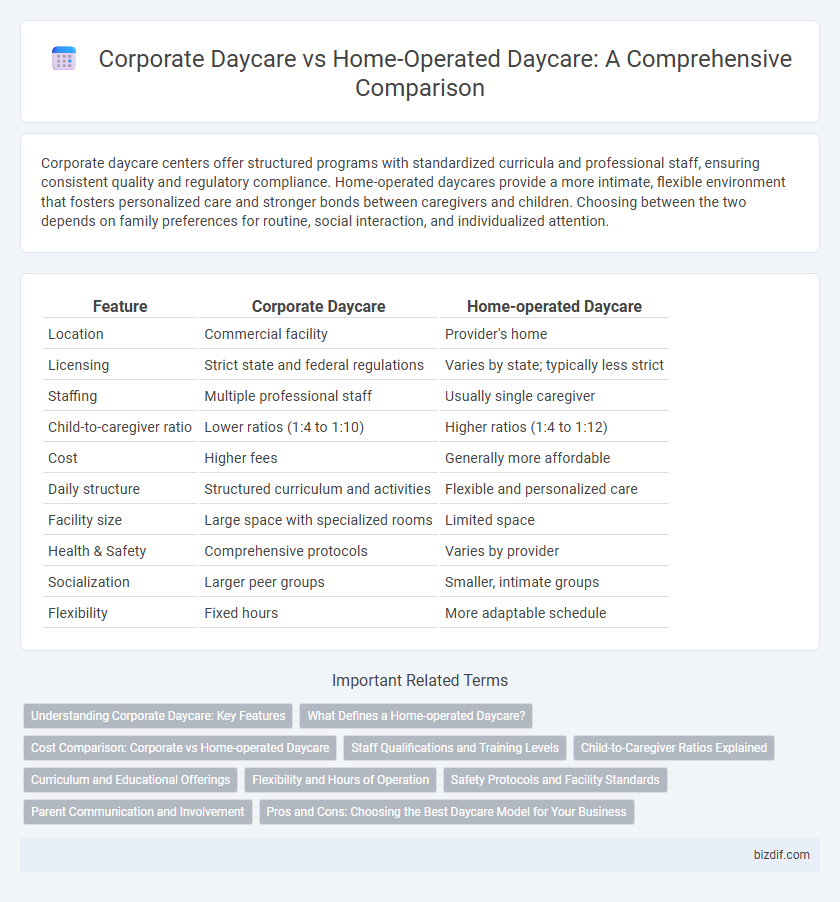Corporate daycare centers offer structured programs with standardized curricula and professional staff, ensuring consistent quality and regulatory compliance. Home-operated daycares provide a more intimate, flexible environment that fosters personalized care and stronger bonds between caregivers and children. Choosing between the two depends on family preferences for routine, social interaction, and individualized attention.
Table of Comparison
| Feature | Corporate Daycare | Home-operated Daycare |
|---|---|---|
| Location | Commercial facility | Provider's home |
| Licensing | Strict state and federal regulations | Varies by state; typically less strict |
| Staffing | Multiple professional staff | Usually single caregiver |
| Child-to-caregiver ratio | Lower ratios (1:4 to 1:10) | Higher ratios (1:4 to 1:12) |
| Cost | Higher fees | Generally more affordable |
| Daily structure | Structured curriculum and activities | Flexible and personalized care |
| Facility size | Large space with specialized rooms | Limited space |
| Health & Safety | Comprehensive protocols | Varies by provider |
| Socialization | Larger peer groups | Smaller, intimate groups |
| Flexibility | Fixed hours | More adaptable schedule |
Understanding Corporate Daycare: Key Features
Corporate daycare centers provide structured programs with standardized curricula designed to support early childhood development while ensuring compliance with regulatory standards. These facilities often feature trained staff, advanced safety protocols, and access to extensive resources such as specialized learning materials and technology-enhanced classrooms. Emphasizing scalability and consistency, corporate daycare centers cater to larger groups of children, offering flexible hours and integrated services for working parents.
What Defines a Home-operated Daycare?
A home-operated daycare is defined by its location within a caregiver's private residence, offering a smaller, more personal environment compared to corporate daycare centers. These daycare settings typically accommodate fewer children, allowing for individualized attention, flexible hours, and a family-like atmosphere. Licensing requirements and safety regulations vary by region but usually include background checks, health inspections, and child-to-caregiver ratio standards.
Cost Comparison: Corporate vs Home-operated Daycare
Corporate daycare centers typically charge higher fees, averaging $1,200 to $1,500 per month, due to standardized curricula, licensed staff, and extensive facilities. Home-operated daycare providers generally offer more affordable rates, ranging from $500 to $900 per month, benefiting from lower overhead costs and flexible scheduling. Families prioritize budget constraints and service quality when comparing the cost-effectiveness of corporate versus home-based daycare options.
Staff Qualifications and Training Levels
Corporate daycare centers typically employ staff with standardized qualifications and comprehensive training programs to ensure consistent quality of care and adherence to regulatory standards. Home-operated daycares often feature caregivers who may possess varying levels of formal education and training, which can result in more personalized but potentially less regulated care environments. The contrast in staff qualifications and training levels directly impacts the reliability, safety, and developmental support provided in each daycare setting.
Child-to-Caregiver Ratios Explained
Corporate daycare centers typically maintain lower child-to-caregiver ratios, often 1:4 for infants and 1:8 for toddlers, ensuring more individualized attention. Home-operated daycares usually have higher ratios, such as 1:6 for mixed-age groups, due to fewer staff members and space constraints. These differences in ratios significantly impact the quality of supervision and personalized care each child receives.
Curriculum and Educational Offerings
Corporate daycare centers offer structured curricula designed by educational specialists, incorporating standardized learning modules that support early childhood development standards. Home-operated daycares typically provide a more flexible, personalized curriculum tailored to individual children's needs, emphasizing social interaction and hands-on activities in a homelike environment. Both models prioritize early learning but differ in formality and scope of educational offerings, impacting children's developmental experiences.
Flexibility and Hours of Operation
Corporate daycare centers often provide extended hours of operation, accommodating parents with non-traditional work schedules and offering consistent flexibility. Home-operated daycares typically have more limited hours, reflecting the caregiver's personal availability and preference for smaller, more adaptable group settings. Flexibility in corporate facilities is structured and predictable, whereas home-operated daycares can offer personalized scheduling but may lack extended or overnight options.
Safety Protocols and Facility Standards
Corporate daycare centers typically follow strict safety protocols and maintain standardized facility standards due to regulatory compliance and regular inspections, ensuring secure environments for children. Home-operated daycares may vary significantly in safety measures and facility quality, often depending on individual caregiver training and local licensing requirements. Parents should evaluate the consistency of safety procedures and facility certifications when choosing between corporate and home-based daycare options.
Parent Communication and Involvement
Corporate daycare centers typically employ structured communication systems such as digital apps and regular newsletters, facilitating consistent updates and streamlined parent involvement. Home-operated daycares often provide more personalized, face-to-face interactions, fostering close parent-provider relationships and flexible engagement. Both models prioritize child well-being but differ in communication style and degree of parental integration.
Pros and Cons: Choosing the Best Daycare Model for Your Business
Corporate daycare centers provide standardized curricula, professional staff, and often better regulatory compliance, ensuring consistency and reliability for families and businesses. Home-operated daycares offer a more personalized, flexible environment with lower overhead costs but may face challenges in scalability and regulatory scrutiny. Evaluating the balance between operational control, quality assurance, and cost-efficiency helps businesses select the optimal daycare model for their workforce needs.
Corporate Daycare vs Home-operated Daycare Infographic

 bizdif.com
bizdif.com